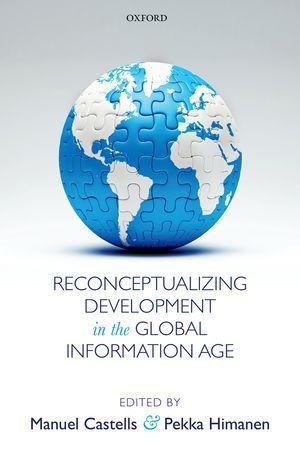Read more
Zusatztext Castells and Himanen reject the classical definition of development as the growth of available resources. They participate in Amartya Sens Intellectual Coup: not resources but access to resources define development, which is synonymous with Human Dignity, and the conditions of development are as much cultural and social as technological. This book will definitely make Dignity the most creative and respected word in the XXIst centurys vocabulary, as Solidarity was in the nineteenth and Reason in the seventeenth. Informationen zum Autor Manuel Castells is University Professor and the Wallis Annenberg Chair in Communication Technology and Society at the University of Southern California, Los Angeles. He is also Professor Emeritus of Sociology and of City and Regional Planning, University of California, Berkeley, as well as Director of Research in the Department of Sociology, and Fellow of St. John's College, University of Cambridge. He has been Professor and Director of the Internet Interdisciplinary Institute, Open University of Catalonia, Barcelona. He has published 26 books, including the trilogy The Information Age: Economy, Society and Culture (Blackwell 1996-2003) and Communication Power (Oxford University Press 2009). He received the 2011 Erasmus Medal from Academia Europaea, the 2012 Holberg Memorial Prize from the Parliament of Norway, and the 2013 Balzan Prize from the Balzan Foundation. Pekka Himanen is Professor at Aalto University in Helsinki and a Visiting Scholar at UC Berkeley. His books include The Hacker Ethic and the Spirit of the Information Age (2001) and The Information Society and the Welfare State (co-authored with Manuel Castells, OUP 2002). Himanen's work has been recognized with several awards, such as the World Economic Forum's respected Global Leader for Tomorrow Award in 2003 and his appointment by the WEF as a Young Global Leader in 2005. Himanen has advised leading global organizations and corporations from the United Nations to Silicon Valley companies, and is also a co-founder of the Global Dignity initiative. Klappentext The book explores the links between information, development, wellbeing and dignity, gathering together a distinguished group of scholars to assess these inter-related concepts in several different areas of the world-Silicon Valley, Costa Rica, Chile, South Africa, Finland, the European Union and China. Zusammenfassung The conditions in which 'development'--the process by which people, individually and collectively, enhance their capacities to improve their lives according to their values and interests--operates have significantly changed in the global information age, a period characterized by the technological revolution in information and communication, the rise of the networking form of social organization, and the global interdependence of economies and societies. This volume aims to redefine the means and goals of development in this new context: first, by characterizing the specific mode of development, informational development, that the authors consider to be the driver of the creation of material wealth in the twenty-first century; secondly, by reconceptualizing human development as the fulfilment of human wellbeing in the multidimensionality of the human experience, ultimately affirming dignity as the supreme value of development; thirdly, by examining the relationship between informational development and human development.After first setting out its analytical framework, the book brings together a diverse set of empirically-rich case studies to illustrate this investigation from across the globe--Silicon Valley, Costa Rica, Chile, South Africa, Finland, the European Union, and China--and concludes by attempting to reconceptualize development. It raises important questions and provides observations, including examining the concept of 'dignity as development', to contribute to a policy de...

